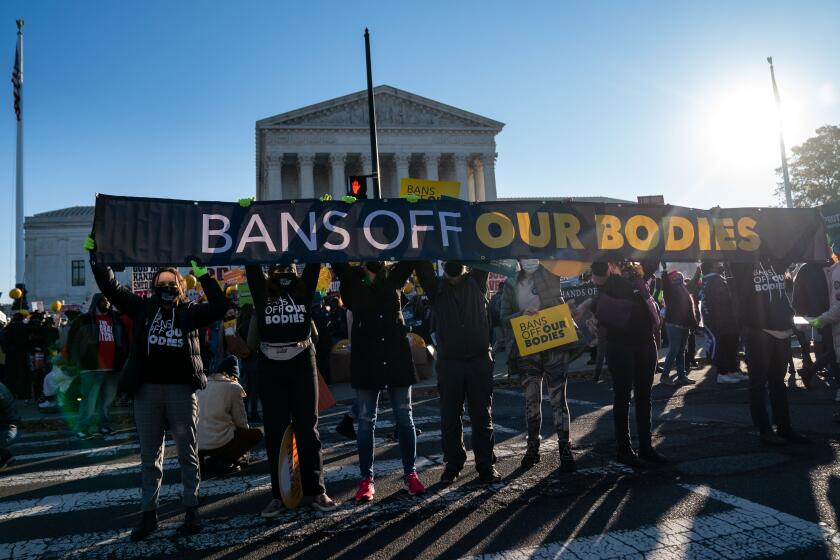Texas abortion law spurs copycat measures, from guns in California to critical race theory in Florida

- Share via
A gun rights group warned the Supreme Court in late October that upholding Texas’ so-called vigilante antiabortion law would have grave consequences for other constitutionally protected activities.
“The most useful way to appreciate the significance of this case is to stop thinking of it as an abortion case and recognize it for what it is,” wrote Erik Jaffe, a Washington, D.C., lawyer for the Firearms Policy Coalition — a vehicle for “deterring the exercise of any and all rights.”
The Supreme Court failed to heed the warning, which came from both the right and the left, and decided 5 to 4 this month to let stand a law that will make obtaining abortions in Texas impossible for most women and that was crafted to prevent abortion rights advocates from obtaining an injunction to block it.
Now political leaders in other states are backing similar legal schemes, not all of them targeting abortion.
The Texas law allows citizens to sue abortion providers and anyone who helps a woman to obtain an abortion after five or six weeks of pregnancy, when many women may not even know of their condition. Successful plaintiffs receive at least $10,000 if they prevail, and the defendants must pay for their legal costs. Abortion providers have no way to block the law in court and cannot recover attorneys fees even if the suit was clearly frivolous.
Gov. Gavin Newsom retaliated days after after the Supreme Court’s ruling, announcing he would lead passage of a California law modeled after the Texas statute but targeted at the gun industry. Newsom’s proposal would allow citizens to sue to stop the sale, distribution and manufacture of assault weapons and ghost guns.
Some legal experts described Newsom’s action as a politically motivated stunt to rally his base before his next election. Others said he was attempting to show “the hypocrisy of the Supreme Court,” which now has an activist right-leaning majority that favors gun rights and opposes abortion.
“As much as you hate abortion or as much as you hate guns, welcome to the world where you get to screw with constitutional rights,” Jaffe said in an interview.
Florida Gov. Ron DeSantis, attempting to portray himself as a conservative populist vengeful of the “elites,” followed Newsom and proposed a law similar to Texas’ last Wednesday aimed at public school instruction. It would give parents a financial incentive to sue schools if teachers appear to be instructing students on critical race theory, an academic framework that analyzes how many legal principles as well as government and business actions stem from racism.
Jaffe said laws like the Texas statute should be condemned by both the right and the left, regardless of the topic targeted. He compared the situation to the American Civil Liberties Union defending the right of neo-Nazis to march in Skokie, Ill., in 1978 because even speech one abhors should be protected.
UCLA law professor Jon D. Michaels, one of several scholars who joined a Supreme Court amicus brief against the Texas law, agreed only to an extent.
A divided Supreme Court refused Friday to block a Texas law that has banned most abortions in the state.
In a perfect world, he said, the Supreme Court would have struck down the abortion law and foreclosed copycats. “We shouldn’t have individual states picking and choosing which constitutional rights they are going to respect and which they are going to turn into target practice,” he said.
On the other hand, “I don’t think it is fair for one side to play differently than the other.” He described Newsom’s proposal as narrow. Assault weapons are not constitutionally protected and already are outlawed in California. If the Supreme Court grants them constitutional protection, a state gun law could then be used to try to enforce a ban.
Newsom’s proposal, Michaels said, amounted to “a progressive counterstrike” to the Supreme Court ruling. “I don’t think one side should unilaterally disarm,” he said.
Stanford law professor John Donohue, who has served as an expert witness for California in gun litigation, said Newsom’s ploy was “probably good” because it might make courts “rethink” their handling of laws like Texas’.
“Tit for tat may be the most effective way to bring the other side back in line,” Donohue said.
In an op-ed Monday in the Washington Post, Newsom said that was his hope.
“Maybe California’s move will lead the court to change its mind about allowing Texas’s bounty-hunter scheme,” Newsom wrote. “If that’s the case, women’s reproductive care across our nation would be better off.”
Not all the new proposals modeled after the Texas law are aimed at constitutional rights, but they allow citizens to collect a “bounty” if they win their lawsuits.
Michaels noted that a bill has been introduced in Illinois to allow citizen lawsuits against people who show false documents to pretend they have been vaccinated against the coronavirus. He said he could foresee a blue state trying to enforce campaign contribution limits by authorizing citizen lawsuits.
These proposed “laws are fundamentally different from any legal regime we are accustomed to,” he said.
Usually, he said, a person can sue only if he or she has been injured. The Texas law allows anyone to bring the suits. It amounts to “legal vigilantism because it is hard to fend off these lawsuits,” Michaels said.
Newsom’s proposal would permit private citizens who win the gun suits to receive at least $10,000 for each violation and court costs and attorneys fees. The U.S. 9th Circuit Court of Appeals is now weighing the constitutionality of the state’s assault weapons ban.
Appeals court upholds California’s ban on large-capacity gun magazines, saying it does not significantly interfere with the right to self-defense.
Jaffe questioned whether Newsom’s proposal, depending on how any future legislation is written, would have a practical effect. Gun businesses in California are already complying with California law, he said.
“If he really wanted to follow Texas down the path, what he would do is ban all guns or the sale of any gun and any ammunition period,” Jaffe said.
Chuck Michel, a lawyer and president of the California Rifle & Pistol Assn., said the gun industry would challenge any California law that further restricted gun rights. The high court’s Texas ruling, he said, should not be read to give states “carte blanche” to follow in Texas’ footsteps.
“Otherwise every red state will go after the civil rights they don’t like, and every blue state will go after the civil rights they don’t like,” Michel said. “That is going to lead to games that no one will like.”
Newsom wrote that he agreed such bounty laws should be stopped.
“But if only radical conservative interests follow Texas’s playbook,” he wrote, “we’ll never see change.”
More to Read
Sign up for Essential California
The most important California stories and recommendations in your inbox every morning.
You may occasionally receive promotional content from the Los Angeles Times.













